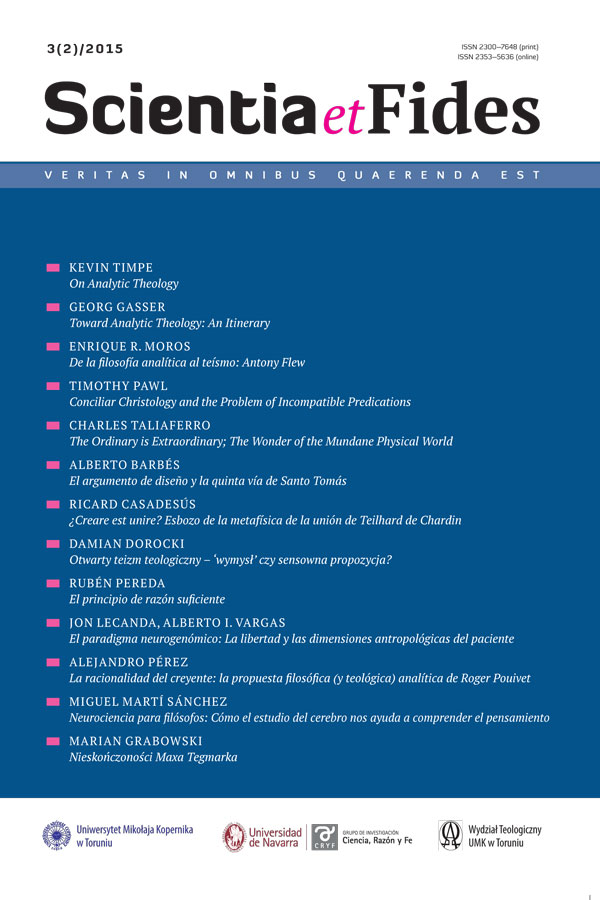Toward Analytic Theology: An Itinerary
Słowa kluczowe
analytic philosophical theology, evidentialist objection, verificationism, reformed epistemology, the rationality of religious beliefAbstrakt
In this paper I aim at explaining how analytic philosophical theology developed into a thriving field of research. In doing so, I place analytic philosophical theology into a larger intellectually narrative that is deeply influenced by the philosophy of Enlightenment. This larger framework shows that analytic philosophical theology aims at providing answers to concerns raised by a philosophical tradition that shaped fundamentally the making of our modern Western secular world.Bibliografia
Abraham, William J. 2009. „Systematic Theology as Analytic Theology“, in Mike C. Rea and Oliver Crisp (eds.) Analytic Theology. New Essays in the Philosophy of Theology. Oxford: Oxford University Press, 54–69.
Carnap, Rudolf. 1932. „Überwindung der Metaphysik durch logische Analyse der Sprache“, in: Erkenntnis 2, 219–241. English translation by Arthur Pap in A. J. Ayer (ed.): Logical Positivism. Glencoe, IL: Free Press, 60–81.
Chignell, Andrew. 2009. “‘As Kant has shown…’”, in: Mike C. Rea and Oliver Crisp (eds.) Analytic Theology. New Essays in the Philosophy of Theology. Oxford: Oxford University Press, 117–135.
Clifford, William K. 1999. “The Ethics of Belief”, in: Eleonore Stump and Michael J. Murray (ed.) Philosophy of Religion: The Big Questions. Malden, Mass.: Blackwell 1999, 269–273. Reprinted from: Clifford, William K: Lectures and Essays. New York: MacMillan 1901, 163–176.
Crisp, Oliver. 2009. “On Analytic Theology”, in: Mike C. Rea and Oliver Crisp (eds.) Analytic Theology. New Essays in the Philosophy of Theology. Oxford: Oxford University Press, 33–53.
Flew, Anthony and MacIntyre, Alasdair (eds.). 1955. New Essays in Philosophical Theology. New York: MacMillan.
Flew, Anthony. 1976. The Presumption of Atheism. London: Pemberton.
Hasker, William. 2005. “Analytic Philosophy of Religion”, in: William J. Wainwright (ed.) The Oxford Handbook of Philosophy of Religion. Oxford: Oxford University Press, 421–446.
Hempel, Carl Gustav. 1955. “Problems and Changes in the Empiricist Criterion of Meaning”, in: Revue Internationale de Philosophie 41, 41–63.
Kaufman, Gordon. 1972. God the Problem. Cambridge: Harvard University Press.
Kant, Immanuel. The Critique of Practical Reason. Translated by Thomas Kingsmill Abbott. http://www.gutenberg.org/cache/epub/5683/pg5683-images.html
Kant, Immanuel. The Critique of Pure Reason. Translated by J. M. D. Meiklejohn. http://www.gutenberg.org/files/4280/4280-h/4280-h.htm
Kant, Immanuel. Prolegomena to Any Future Metaphysics That Will Be Able to Present Itself as a Science. Based on the 1902 translation by Paul Carus. http://www.webexhibits.org/causesofcolor/ref/Kant.html
Locke, John. Of the Conduct of the Understanding. Online source: http://www.earlymoderntexts.com/assets/pdfs/locke1706.pdf
Mackie, John L. 1955. „Evil and Omnipotence“, in: Mind 64, 200–212.
Mavrodes, George. 1970. Belief in God. A Study in the Epistemology of Religion. New York: Random House.
Pike, Nelson. 1965. “Divine Omniscience and Voluntary Action”, in: The Philosophical Review 74/1, S. 27–46.
Plantinga, Alvin. 1974. The Nature of Necessity. Oxford: Clarendon Press.
Plantinga, Alvin. 1983. “Reason and Belief in God”, in: Plantinga Alvin and Wolterstorff, Nicholas (eds.): Faith and Rationality. Reason and Belief in God. Notre Dame University Press, 16–93.
Plantinga, Alvin. 1984. “Advice to Christian Philosophers”, in: Faith and Philosophy 1/3, 253–271. http://www.faithandphilosophy.com/article_advice.php
Plantinga, Alvin. 1993. “Spiritual Autobiography“, in: Kelly James Clark (ed.) Philosophers Who Believe in God. The Spiritual Journey of 11 Leading Thinkers. Downers Grove, IL: InterVarsity Press, 45–82.
Pouviet, Roger. 2011. “On the Polish Roots of the Analytic Philosophy of Religion”, in: European Journal for Philosophy of Religion 3/1, 1–20.
Quinn, Philip L. 1985. “In the Search of the Foundations of Theism”, in: Faith and Philosophy 2/4, 469–486.
Rea, Michael C. 2009. “Introduction”, in: Mike C. Rea and Oliver Crisp (eds.) Analytic Theology. New Essays in the Philosophy of Theology. Oxford: Oxford University Press, 1–30.
Scriven, Michael. 1966. Primary Philosophy. New York: McGraw-Hill.
Stump, Eleonore. 2010. Wandering in Darkness. Narrative and the Problem of Suffering. Oxford: Oxford University Press.
Swinburne, Richard. 1977. The Coherence of Theism. Oxford: Oxford University Press.
Swinburne, Richard. 1979. The Existence of God. Oxford: Oxford University Press.
Swinburne, Richard. 1994. “Intellectual Autobiography”, in: Allan G. Padgett (ed.) Reason and the Christian Religion. Essays in honour of Richard Swinburne. Oxford: Clarendon Press, 1–18.
Vanhoozer, Kevin J. 2003. “Theology and the condition of postmodernity: a report on knowledge (of God)”, in: Vanhoozer, Kevin J (ed.) The Cambridge Companion to Postmodern Theology. Cambridge: Cambridge University Press, 3–25.
Wissenschaftliche Weltauffassung: der Wiener Kreis. Veröffentlichungen des Vereins Ernst. 1929. Wien: Artur Wolf Verlag. Online source: (last access on 16.10.2015): http://neurath.umcs.lublin.pl/manifest.pdf
Wolterstorff, Nicholas. 1996. John Locke and the Ethics of Belief (Cambridge Studies in religion and critical thought 2). Cambridge University Press.
Wolterstorff, Nicholas. 2009. “How Philosophical Theology Became Possible within the Analytic Tradition of Philosophy”, in: Mike C. Rea and Oliver Crisp (eds.) Analytic Theology. New Essays in the Philosophy of Theology. Oxford: Oxford University Press, 155–168.
Wolterstorff, Nicholas. 2010. “Analytic Philosophy of Religion: Retrospect and Prospect”, in: T. Lehtonen and T. Koistenen (eds.) Perspectives in Contemporary Philosophy of Religion. Helsinki: Luther-Agricola Society. Reprinted in: T. Cuneo (ed.) Inquiring about God. Selected Essays. Volume I. Cambridge: Cambridge University Press, 17–34.
Pobrania
Opublikowane
Jak cytować
Numer
Dział
Licencja
CC BY ND 4.0. Posiadaczem prawa autorskiego (Licencjodawcą) jest Autor, który na mocy umowy licencyjnej udziela nieodpłatnie prawa do eksploatacji dzieła na polach wskazanych w umowie.
- Licencjodawca udziela Licencjobiorcy licencji niewyłącznej na korzystanie z Utworu/przedmiotu prawa pokrewnego w następujących polach eksploatacji: a) utrwalanie Utworu/przedmiotu prawa pokrewnego; b) reprodukowanie (zwielokrotnienie) Utworu/przedmiotu prawa pokrewnego drukiem i techniką cyfrową (e-book, audiobook); c) wprowadzania do obrotu egzemplarzy zwielokrotnionego Utworu/przedmiotu prawa pokrewnego; d) wprowadzenie Utworu/przedmiotu prawa pokrewnego do pamięci komputera; e) rozpowszechnianie utworu w wersji elektronicznej w formule open access na licencji Creative Commons (CC BY-ND 3.0) poprzez platformę cyfrową Wydawnictwa Naukowego UMK oraz repozytorium UMK.
- Korzystanie przez Licencjobiorcę z utrwalonego Utworu ww. polach nie jest ograniczone czasowo ilościowo i terytorialnie.
- Licencjodawca udziela Licencjobiorcy licencji do Utworu/przedmiotu prawa pokrewnego nieodpłatnie na czas nieokreślony
PEŁEN TEKST UMOWY LICENCYJNEJ >>
Statystyki
Liczba wyświetleń i pobrań: 481
Liczba cytowań: 3



